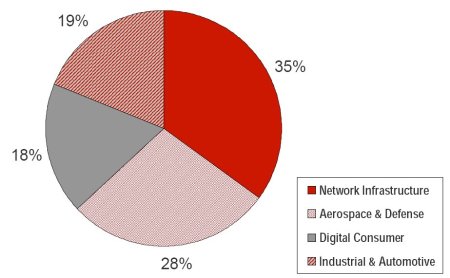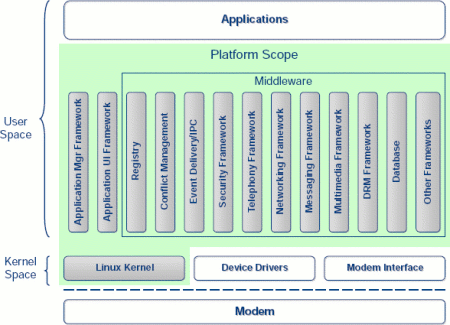Linux-based consumer products drive Wind River earnings
Dec 5, 2007 — by Eric Brown — from the LinuxDevices Archive — 1 views Wind River yesterday announced solid 3Q earnings, touting wins in embedded Linux consumer electronics. In its earnings call yesterday, the Alameda, Calif.-based embedded Linux OS and tools vendor pointed to the growth in Linux-based mobile handsets and telematics as key drivers of the company's growth.
Wind River yesterday announced solid 3Q earnings, touting wins in embedded Linux consumer electronics. In its earnings call yesterday, the Alameda, Calif.-based embedded Linux OS and tools vendor pointed to the growth in Linux-based mobile handsets and telematics as key drivers of the company's growth.
Wind River's fiscal 3Q 2008 revenues were $81.6 million, up 16 percent from $70.5 million in 3Q fiscal 2007, reported the company, beating Wall Street projections. However, Wind River projected its 4Q numbers ending January 31st to be between $84-$86 million, slightly below projections. The company expected its full fiscal year 2008 revenues to fall between $328-$330 million. Wind River noted it expects to increase revenues by 15 percent in FY09, anticipating that new opportunities will offset the slower growth in its subscription business seen over the last two quarters. The full report is available here.

Q3 FY08 bookings by end market - Source: Wind River
In the earnings call, Ken Klein, Wind River's chairman, president and CEO, noted continued strong sales in the company' traditional networking, aerospace, and defense applications, yet pinpointed mobile handsets and automotive infotainment as particular areas of hot growth. “Customers continue to adopt our Linux solutions, with key wins in mobile handsets and automotive equipment,” he said. “We made an intentional strategic shift to pursue large services-led Linux verticals, and we've been successful. In handsets, automotive infotainment, and digital video we're already seeing the results.”
In the handset area, where Wind River's Platform for Consumer Electronics (PCE) is a relative newcomer to the scene, Klein pointed to its membership in the Open Handset Alliance (OHA), supporting Google's Android phone stack, as a milestone, noting that Wind River is the only major full-service commercial Linux software provider in the group. “Since the OHA announcement, our sales pipelines of tier-1 mobile handset manufacturers has increased measurably,” he said.
Klein also pointed to Wind River's participation in the LiMo Foundation and its related deal with phone software and services provider Celunite as opening another promising opportunity in handsets, predicting several LiMo-based wins will close this quarter. Launched in January by Motorola, NEC, NTT DoCoMo, Panasonic Mobile Communications, Samsung Electronics, and Vodafone, LiMo aims to collaboratively develop an open, royalty free Linux-based software reference design, on top of which handset vendors, silicon and reference board vendors, phone software stack providers, and other players can build differentiated products. Celunite and Wind River plan to integrate Celunite's mobile Linux platform, applications suite, and development tools with Wind River's kernel and tools based on the LiMo reference design.

LiMo Platform architecture
(Click to enlarge)
Meanwhile, Klein is optimistic about Wind River's recent entry into the automotive infotainment market, where it its PCE suite also comes into play. He noted that Wind River is developing a Linux development kit for Freescale's top-end telematics processor, the MPC5121e, noting, “In Q3 we had a design win with tier-1 European auto supplier and we have more coming in Q4.”
In the handset and automotive area, Klein added, Wind River is shifting to a unit-based business model in which revenues are “directly tied to the number of handsets our customers ship.” Such a model departs from the royalty-free licensing model traditionally offered by commercial embedded Linux providers.
Finally, networking equipment continued strong, said Klein, representing 35 percent of Wind River's bookings in the quarter. Klein noted Wind River's recent partnership with Cavium and an upcoming new release of Wind River Carrier Grade Linux supporting the Carrier Grade Linux (CGL) 4.0 spec as signs of future progress in the sector.
The Cavium deal is based on Wind River's legacy RTOS (real-time operating system) VxWorks 6.6, which is slated to run in symmetric multi-processing (SMP) mode by year's end. Klein had little more to say about VxWorks except to note that VxWorks 6.0 bookings were up 10 percent, and he expected continued strong sales in the aerospace segment based on the upcoming SMP support. He also noted an increase in Linux/VxWorks combination wins, mentioning a recent dual-OS sale to the Jet Propulsion Lab (JPL). The company did not break down its revenues based on OS.
This article was originally published on LinuxDevices.com and has been donated to the open source community by QuinStreet Inc. Please visit LinuxToday.com for up-to-date news and articles about Linux and open source.